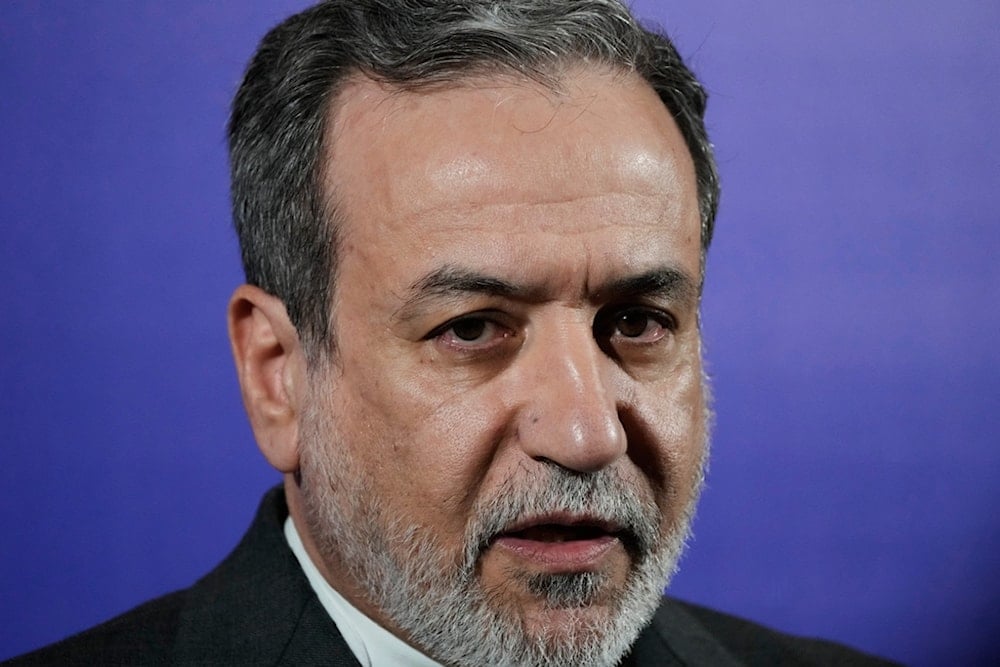Iran will never accept zero uranium enrichment under any deal: Iran FM
Iranian Foreign Minister Abbas Araghchi reaffirmed that Tehran will never accept "zero enrichment" despite Western pressure, insisting that Iran’s nuclear rights and sovereignty remain non-negotiable.
-

Iranian Foreign Minister Abbas Araghchi speaks in a new briefing after attending a conference titled "International Law Under Assault: Aggression and Self-Defense," in Tehran, Iran, Sunday, Nov. 16, 2025 (AP Photo/Vahid Salemi)
Iranian Foreign Minister Abbas Araghchi on Wednesday stated that Iran "will not accept the zeroing of uranium enrichment," describing the nuclear file as "a symbol of pride and sovereignty" for the country, and noting that Iran has "paid for it with martyrs and heavy sacrifices."
Araghchi stressed that any "agreement that includes zero enrichment would be considered a betrayal by Tehran" and "will not be acceptable under any circumstances."
He added that cooperation between Iran and the International Atomic Energy Agency (IAEA) is ongoing, but clarified that "this cooperation does not include inspections of the facilities that were targeted in the recent attack," noting that Iran will not engage with the Agency regarding sites bombed by the United States and "Israel." He pointed to recent IAEA technical work at the Bushehr nuclear power plant as an example of cooperation with facilities that were not attacked.
Defending Nuclear Rights
Araghchi’s comments reflect Iran’s firm position at a moment of heightened pressure, as Western governments push for expanded restrictions on Iran’s peaceful nuclear program through political maneuvering at the IAEA and continued sanctions. Iranian officials argue that these efforts seek to impose conditions that violate the Nuclear Non-Proliferation Treaty (NPT), especially Iran’s right to enrichment, while ignoring the security threats Iran has faced following direct US-Israeli strikes on its nuclear infrastructure.
On Wednesday, IAEA Director General Rafael Grossi told the Agency’s Board of Governors that consultations with Iran were ongoing to restore inspection activities, noting that more than a dozen inspections had already been conducted. He said “significant technical understandings” had been reached with Iran during talks in Cairo, calling diplomacy the only viable path forward. Grossi was also questioned about a draft resolution submitted by European states seeking a new oversight agenda in Iran, including demands for Iran to clarify the location of its enriched uranium after the attacks, an initiative Tehran views as politically motivated.
Tehran maintains that its caution toward the IAEA is rooted directly in the US-Israeli attacks that targeted several nuclear sites in June. Iran’s Atomic Energy Organization has repeatedly accused the IAEA of failing to uphold neutrality and professionalism, stressing that the precision of the strikes suggests that sensitive technical information shared with the Agency was exploited. Iranian officials, including Atomic Energy Organization chief Mohammad Eslami, have said that the only laboratory Iran built in full coordination with the IAEA was among those hit.
Nuclear Sovereignty
In response to the attacks, Iran’s parliament moved to restrict unrestricted access to nuclear sites, emphasizing that national security must be safeguarded before any expansion of inspection activities can resume. While the Cairo understandings marked a step toward gradual re-engagement, Tehran insists that cooperation must proceed strictly within Agency regulations and only at facilities not targeted in hostile operations.
Grossi affirmed that the IAEA retains its mandate under the Comprehensive Safeguards Agreement and that Iran remains within the framework of the NPT. But tensions persist as Iran continues to demand genuine neutrality from the Agency, particularly after the June strikes exposed serious vulnerabilities in the handling of Iran’s sensitive nuclear data.
Read more: Tehran says 'Israel' used IAEA info to strike nuclear sites

 3 Min Read
3 Min Read









